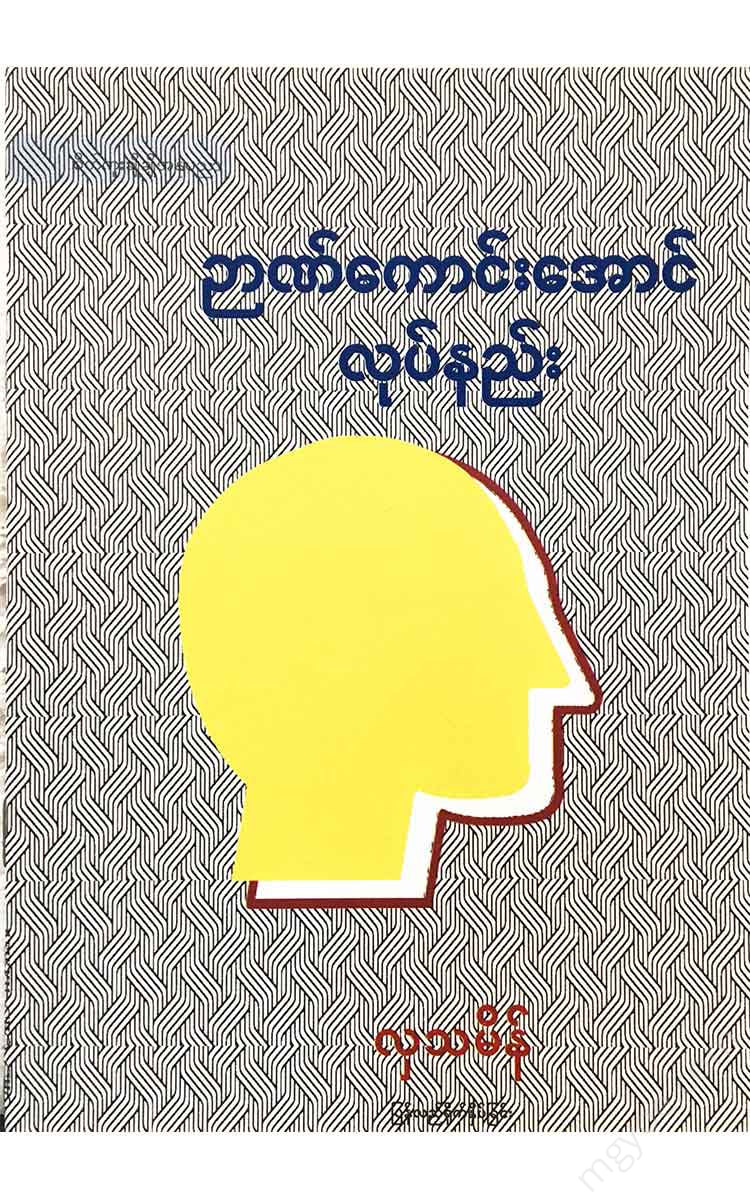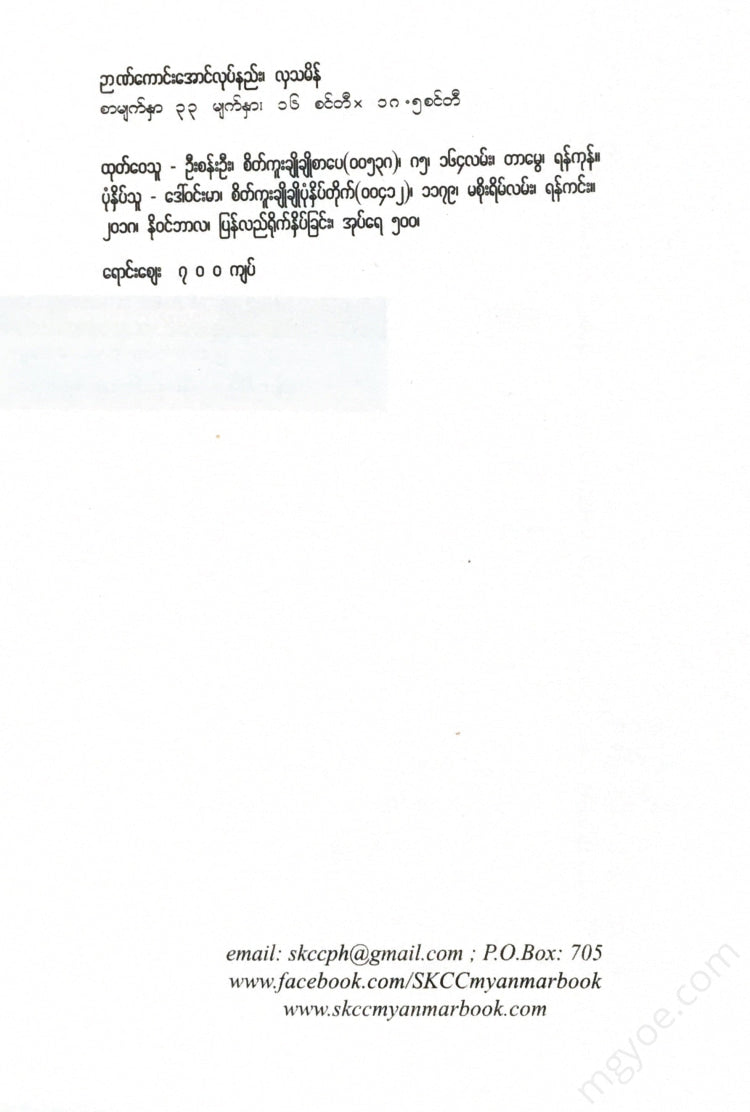စိတ်ကူးချိုချိုစာပေ
Hlasmaein - How to make yourself smart
Hlasmaein - How to make yourself smart
Couldn't load pickup availability
Wisdom is
Before we can analyze how to be wise (or how to make wise), it is necessary to fully understand the concept of wisdom. Wisdom is classified in various ways. However, if we summarize the main points, it is easy to understand.
It can be said that the human being is composed of five elements, which are called the five elements. In fact, he is a being composed of five elements. These five elements can be summarized into three types: physical form, mind, and the cause of mind, the seta.
The five aggregates are only two types of material (physical) and mental (feeling, perception, mental formations, and consciousness). In that mental formation, the three types of mental formations, including good and bad feelings, feeling, recognition of good and bad, and all other phenomena, are called setasika, and all mental phenomena are called consciousness. This is the essence of the five aggregates.
Of the two elements in man, form and name, mind and body are included in name. Mind and body include a part called intelligence. Therefore, as the saying goes, “A snail has hair, and a person has intelligence,” a snail without hair is empty, just as a person without intelligence is empty. It can be said that if a person is a person, he must have intelligence. That intelligence will vary in degree, but in degree.
Regarding intelligence, we use the terms "great intelligence", "great intelligence", "good intelligence", "more intelligence", "more rapid intelligence", etc. "less intelligence", "dull intelligence", "slow intelligence", etc. "agile", "rich intelligence", "light intelligence", etc. "red intelligence", "deep intelligence", "intelligent intelligence", etc. "intelligent intelligence", "skillful intelligence", "wise intelligence", "thought intelligence", "discernment intelligence", "skillful intelligence", "intelligent intelligence", etc. All these words only describe the major and minor types of intelligence in a limited way.
There are also many things to consider about wisdom in Buddhist literature. The Buddha is considered to have infinite wisdom, a wealth of wisdom that has no end. Wisdom in particular is the most prominent feature of the Buddha.
The ten wisdoms are known as follows.
1. The wisdom that distinguishes between what is true and what is not.
(Divisional wisdom)
2. The wisdom that discerns good and evil,
(Viparka knowledge)
3. The wisdom that perfectly understands the fate of beings.
(Sabbatagamini wisdom)
4. The ability to distinguish between various substances.
(Nanadharma intelligence)
5. The wisdom that knows the desires of beings.
(Intellectual intelligence)
6. The wisdom that knows the subtleties of the ability of beings to protect and control.
(Indian wisdom)
7. The wisdom that recognizes the defilements of meditation,
(Jhana, sound, and knowledge of the senses)
8. The ability to recall past lives,
(Pubbenivasa wisdom)
9. A deep intellect that is able to see and perceive with keen insight,
(Divine wisdom)
10. An open mind that can see the path,
(Ashvakkaya wisdom)
Among these ten types of knowledge, apart from the knowledge that is unique in its perfection, it can be said that the knowledge of the various aspects of knowledge, the knowledge of the senses, the knowledge of the senses, and the knowledge of the various chemical elements are also different in origin, but they can also be said to be the kind of knowledge that ordinary people can achieve through effort.
Moreover, the three wisdoms, the eight wisdoms, etc., which the Buddha perfected are also wisdoms. The three wisdoms are the wisdoms of the ten wisdoms mentioned above...
8. The wisdom of the wise.
9. Divine wisdom,
10. The wisdom of the mind,
And so on, those three are also included in the eight wisdoms. The remaining five wisdoms in the eight wisdoms are...
1. The ability to create various powers
(Iddhi-visa-nyan)
2. The ability to hear all sounds
(Divine wisdom)
3. Discriminating intelligence that follows the dictates of the mind
(Satāpriya Nānā)
4. The mind that can make any thought come true
(Intellectual intelligence)
5. The wisdom that sees the Dhamma of insight.
(Insight)
These are truly powers that depend on the minds of extraordinary individuals, and are not the kind of knowledge that ordinary people can easily study and practice.
In addition, there are ten types of insight knowledge that should be cultivated in the minds of those who practice meditation.
Those ten wisdoms are...
1. The intellect that perceives form and name by observing the three characteristics.
(Contemplative wisdom)
2. The wisdom that sees the emergence and decline of dharmas
(Udayabhavnanya)
3. The wisdom that sees the destruction of form and name.
(Bangan wisdom)
4. The mind that sees the terrifying aspects of form and name.
(Wisdom)
5. The wisdom that sees the evil of material and mental phenomena.
(Adinava Nyan)
6. The mind that is disgusted with form and name and is tired of it.
(Nibbāda knowledge)
7. The wisdom of wanting to be free from events and judgments.
(Muggittu Kantarani)
8. The wisdom that sees events and decisions in comparison with the three characteristics
(Consciousness of birth)
9. The mind that can see past events and decisions.
(Samsara-rupakka knowledge)
10. The intellect that compares and views the paths and outcomes according to the stages of knowledge.
(Anu-loma-nyan)
That is, these are the kinds of knowledge that penetrate the nature of the Dhamma and distinguish and name the forms of knowledge.
If we were to analyze and analyze all of the knowledge, not by its content, but by its essence, then all of the knowledge...
1. Intelligence
2. Memory
3. Thinking ability
4. Of the four types of extraordinary intelligence
It should be seen that it is included.
How much do you know in your knowledge, how widely do you know, how deeply do you know, how insightfully do you know, how critically do you know? All of this knowledge is included in the field of knowledge.
Memory includes all the mental states that are produced by taking into the mind everything that is remembered, everything that is taken into the heart, everything that is assumed, everything that is believed, and everything that is accepted.
In thinking, all the imagination, all the analysis, all the creative efforts of the mind that call forth new ideas will play a role in thinking.
Not included in these categories are intelligences that are extraordinary beyond ordinary intelligences, intelligences that are more collective than any one type of intelligence, and intelligences that are related to the supernatural or the strange and wonderful.
The type of intelligence that can be distinguished by the name of extraordinary intelligence is that which is possessed by very rare intellectuals, intellectual experts, transcendental individuals, and those who have emerged from the



